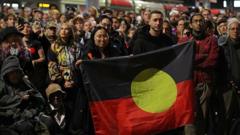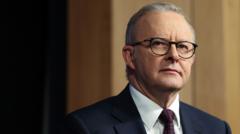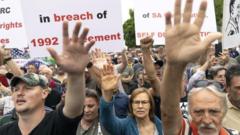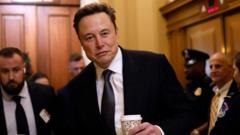Despite ongoing socio-economic disparities faced by Indigenous Australians, major parties remain silent, raising concerns over the future of First Nations advocacy.
Indigenous Silence Amidst Australian Election Campaign
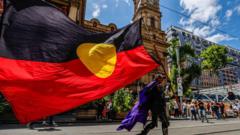
Indigenous Silence Amidst Australian Election Campaign
As the Australian election approaches, Indigenous voices are notably absent from political discourse, highlighting a national neglect of Indigenous issues.
In the lead-up to the upcoming national elections, the Indigenous community of Yarrabah, located in Far North Queensland, appears disconnected from the political fervor that characterizes much of Australia. The absence of candidate posters along the coastal roads leading into the town stands as a stark symbol of the deeper issues at play. Suzanne Andrews, the chief executive of Gurriny Yealamucka Health Services in Yarrabah, voiced her disappointment over the lack of visibility and discussion surrounding Aboriginal issues during political debates.
Indigenous Australians, who constitute approximately 3.8% of the population, are often deemed the most socio-economically disadvantaged group in the country. However, both Prime Minister Anthony Albanese and Opposition Leader Peter Dutton have shown reluctance to engage on matters concerning First Nations. An exception arose when Dutton noted that "welcome to country" ceremonies were "overdone," marking one of the few instances where Indigenous topics were addressed, and unfortunately, not in a constructive context.
The controversial referendum held in 2023 to establish a Voice to Parliament for Aboriginal and Torres Strait Islander peoples ended in significant electoral defeat, leading many politicians to avoid discussing Indigenous issues altogether, seen as taking on too much political risk. Andrews lamented that the fallout from the failed referendum now leads parties to sidestep critical topics.
Indigenous leaders such as Lidia Thorpe argue that the current climate reflects a broader disengagement from discussing Indigenous rights and needs since the referendum outcome. Thorpe, a notable advocate for an Indigenous treaty, expressed frustration at the election's lack of discourse on the critical situation facing Indigenous people.
This silence amid a critical electoral moment is compounded by the government's Closing the Gap initiative that, despite ongoing efforts to address Indigenous disadvantage, shows minimal progress in many areas. Data indicates deteriorating conditions in key measures, such as rising incarceration rates among Aboriginal people.
Experts suggest this current trend of avoidance stems from an observable decrease in the general public's prioritization of Indigenous issues, aligning with the loss of dialogue after the referendum. Many advocates and political figures, including independent MP Bob Katter, admit that bringing up these pressing issues can be detrimental to garnering votes, perpetuating a cycle of neglect.
Confronted with rising racism post-referendum, the struggle continues for many Indigenous Australians, with grassroots leaders stressed over feelings of alienation in their own communities. The aftermath has ushered a tactical withdrawal from political discourse among some, with many feeling it is in their best interest to remain under the radar.
As the Australian electorate heads towards an important election, the urgent need for a respectful and informed dialogue about Indigenous rights remains largely unaddressed, disappointing many who hoped for substantive change and recognition in political discussions.
Indigenous Australians, who constitute approximately 3.8% of the population, are often deemed the most socio-economically disadvantaged group in the country. However, both Prime Minister Anthony Albanese and Opposition Leader Peter Dutton have shown reluctance to engage on matters concerning First Nations. An exception arose when Dutton noted that "welcome to country" ceremonies were "overdone," marking one of the few instances where Indigenous topics were addressed, and unfortunately, not in a constructive context.
The controversial referendum held in 2023 to establish a Voice to Parliament for Aboriginal and Torres Strait Islander peoples ended in significant electoral defeat, leading many politicians to avoid discussing Indigenous issues altogether, seen as taking on too much political risk. Andrews lamented that the fallout from the failed referendum now leads parties to sidestep critical topics.
Indigenous leaders such as Lidia Thorpe argue that the current climate reflects a broader disengagement from discussing Indigenous rights and needs since the referendum outcome. Thorpe, a notable advocate for an Indigenous treaty, expressed frustration at the election's lack of discourse on the critical situation facing Indigenous people.
This silence amid a critical electoral moment is compounded by the government's Closing the Gap initiative that, despite ongoing efforts to address Indigenous disadvantage, shows minimal progress in many areas. Data indicates deteriorating conditions in key measures, such as rising incarceration rates among Aboriginal people.
Experts suggest this current trend of avoidance stems from an observable decrease in the general public's prioritization of Indigenous issues, aligning with the loss of dialogue after the referendum. Many advocates and political figures, including independent MP Bob Katter, admit that bringing up these pressing issues can be detrimental to garnering votes, perpetuating a cycle of neglect.
Confronted with rising racism post-referendum, the struggle continues for many Indigenous Australians, with grassroots leaders stressed over feelings of alienation in their own communities. The aftermath has ushered a tactical withdrawal from political discourse among some, with many feeling it is in their best interest to remain under the radar.
As the Australian electorate heads towards an important election, the urgent need for a respectful and informed dialogue about Indigenous rights remains largely unaddressed, disappointing many who hoped for substantive change and recognition in political discussions.


